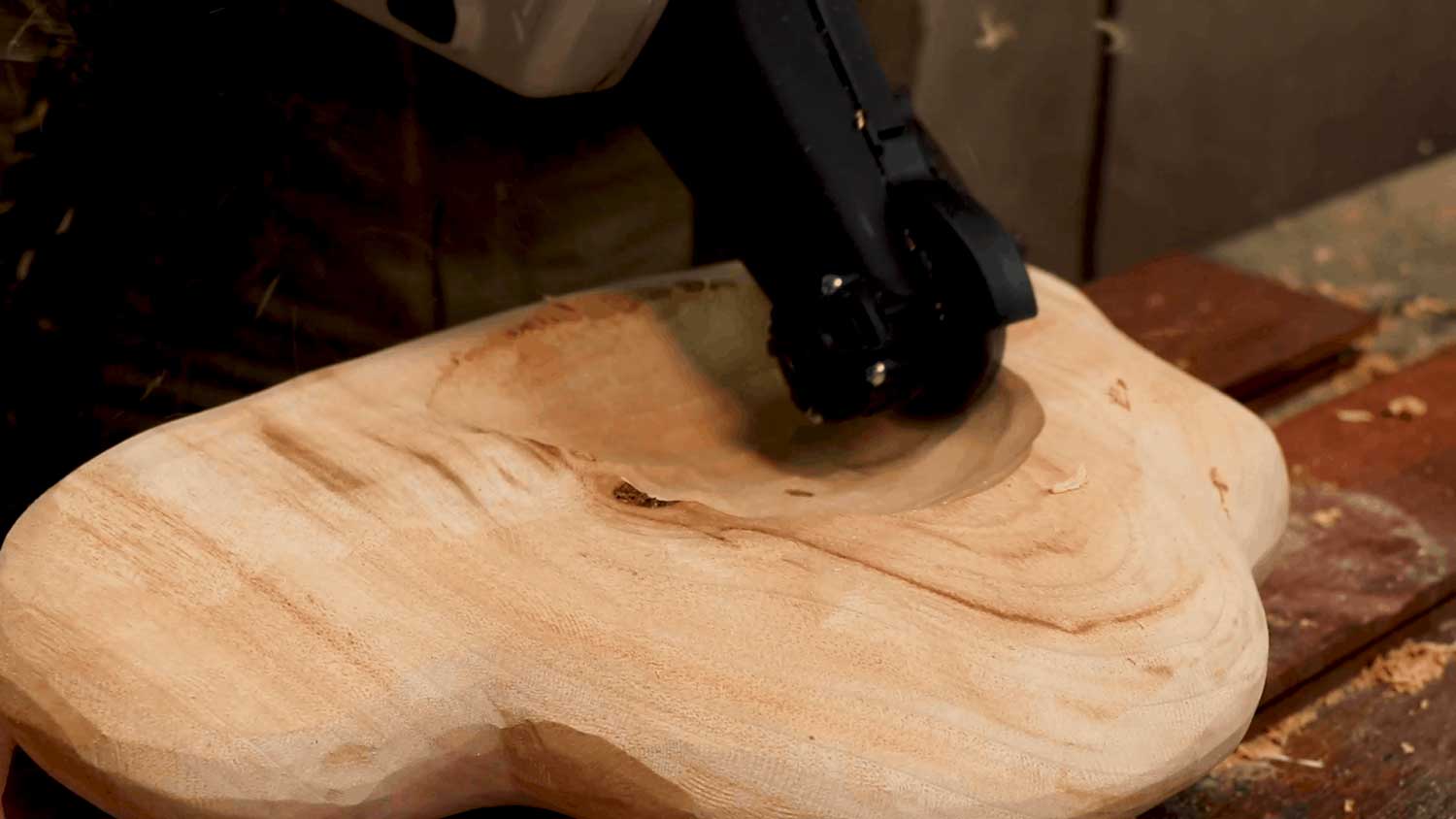
The kids cloud clock is a fun, easy project that looks great in any nursery or kids playroom and makes a great personalized gift idea. You can get really creative with your own spin on the shape of the clock and colors, giving it a bright happy finish or a funny moody cloud look.
Find a timber to suit your design.
Look for inspiration for your clock shape. We were inspired by a cloud design we found on Pinterest for a nursery and made a few changes to make it our own. We created the rough shape of the cloud and raindrops on the computer then printed it. We simply cut out the cloud and drops, and traced around the outside straight onto the piece of wood. If you have your own ideas in mind simply sketch straight onto the wood. Make sure you sketch in the sections of the cloud that you want raised to give you a 3D effect and the fluffy cloud-like feel.
Start cutting out the clock
You are ready to start carving. Firmly clamp the timber to a bench and using the Mini Carver with the Mini Pro Blade begin cutting away the outline of the cloud design. Don’t worry about shaping the fluffiness of the clouds yet, this step is all about getting the outline right
Shape the curves giving it 3D elements
When you are happy with the rough outline of the clock it’s time to give it 3D contours and rounded edges. We penciled in the areas that we wanted to carve away to give the cloud a fluffy feel, which we had to redo from time to time as the carving process removed the pencil markings. How aggressively you chose to shape the cloud at this stage really is a matter of taste. We just added gentle contours and relied on the painting to further enhance depth and the shape.

Remember that you want the clock face (the circle with the numbers) to be on a relatively flat surface, so keep the majority of the shaping to the outside.
Shape the back of the clock
Turn the cloud over and continue shaping the outer contours and curves. As the back is where the clock mechanism will be placed it doesn’t really need much 3D shaping. A flat section where clock mechanism will be located will also ensure it fits up against the wall nicely when it is hung.
Rough sanding/ fine shaping
Once you are happy with the general shape of the clock it is time to sand. Attach a relatively coarse sandpaper grit to the flexible sanding pad and then onto the Mini Carver. It is important to adjust the speed of the tool to around 3, to ensure you don’t over do the shaping or burn the wood. Play with the setting to see what works best for you.
Drilling the hole for the clock mechanism shaft
Mark out where you want the numbers on the face of the clock to sit and where the centre is. This is where the shaft of the clock mechanism will come through and where you need to drill a hole. Make sure your drill bit is wider than the diameter of the clock shaft, so it fits through easily.



Carve out the timber to fit the clock mechanism
On the back of the cloud you will need to hollow out the wood to allow for the clock mechanism to be positioned. Mark out the side of the mechanism (ours was square) and start to carefully carve using the Mini Pro with the Mini Turbo Blade. (You can also use the TURBO Shaft).
Just keep an eye on the depth of the hole as you carve. You want to ensure the clock shaft comes out on the front side of the clock, and allows enough space to fit the hands.

The depth of the void is crucial to making the mechanism sit properly out the front. This may require multiple test fits and adjustments. Be patient and trust in the process!
Sand some more
Using the Mini Carver sanding attachment, use a finer grit sandpaper this time and sand the entire clock to achieve a smooth finish. You can then use the Contour Sander to further smooth out the surfaces or hand sand with fine-grit sandpaper to finish.
Time to shape the raindrops
Shape the raindrops using the Mini Carver and the Mini Pro by carefully clamping each raindrop to a table and gently shaping the curves.
This part can be a bit tricky depending on the side of the rain drops. When clamping smaller items, sometimes small scrap piece of wood help to hold it in place.
Make the back of the raindrops flat so they sit straight against the wall.
Sand the raindrops
Go back to the Mini Carver Sanding attachment, start with the coarse grit and make your way to the finer sandpaper. By the time you are finished that should feel relatively smooth.
Make sure you sand the back of the raindrops flat just like you carved them.
Paint
This part is really up to you but as we weren’t very aggressive in shaping the cloud so we used the paint to give the clock additional depth.
We covered the cloud with a white base and feathered out the blue paint to accentuate the curves and the fluffiness of the cloud. We also chose 4 different colours for each raindrop and used poster paint with a pearl additive to achieve a shimmery look.
We also gave the clock face a cute little smile with sleepy eyes. Perfect for the nursery.
Fit the mechanism
Fit the clock mechanism and the numbers (You can also chisel out the numbers if you wish)
Hang it up!
Set the clock the time, put batteries in it and hang on the wall. Voilla! P.S. We won’t blame you if you spend the entire afternoon admiring your clock.